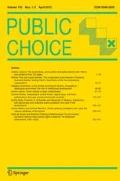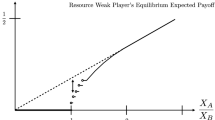Abstract
This paper reconsiders the relationship between the rules of a game and its outcomes. We develop a notion of rule reform that leads to the selection of Pareto improved equilibria points. We then apply this notion to a series of naturally occurring fishing rules, including examples from Malaysia, India, Brazil, Turkey, and Canada. We show that reforming a game is conceptually akin to reforming an economy.
Similar content being viewed by others
References
Anderson, E.N. and Anderson, M.L. (1977). Fishing in troubled waters: Research on the Chinese fishing industry in West Malaysia. Asian Folklore and Social Life Monographs, Vol. 100. Taipai: The Orient Cultural Service.
Anderson, T.L. and Hill, P.J. (1975). The evolution of property rights: A study of the American west. Journal of Law and Economics 12: 163–179.
Barzel, Y. (1968). Optimal timing of innovations. Review of Economics and Statistics 50: 348–355.
Barzel, Y. (1974). A theory of rationing by waiting. Journal of Law and Economics 17: 73–95.
Berkes, F. (1986). Local-level management and the commons problem: A comparative study of Turkish coastal fisheries. Marine Policy 10(July): 215–229.
Chomsky, N. (1980). Rules and representations. New York: Columbia University Press.
Clark, C.W. (1980). Restricted access to common-property fishery resources: A game theoretic analysis. In P.-T. Liu (Ed.), Dynamic optimization and mathematic economics, 117–132. New York: Plenum Press.
Clugston, M. (1984). Nova Scotia's lobster wars. Maclean's 84: 14–18.
Commons, J.R. (1957). Legal foundations of capitalism. Madison: University of Wisconsin Press.
Cordell, J.C. and McKean, M.A. (1986). Sea tenure in Bahia, Brazil. In Proceedings of the conference on common property resource management, 85–114. Washington, DC: National Academy Press.
Epstein, R.A. (1986). Past and future: The temporal dimension in the law of property. Washington University Law Quarterly 64(Fall): 667–722.
Faris, J.C. (1972). Cat harbour: A Newfoundland fishing settlement. Toronto: University of Toronto Press.
Forman, S. (1967). Cognition and the catch: The location of fishing spots in a Brazilian coastal village. Ethnology 6: 417–426.
Forman, S. (1970). The raft fishermen: Tradition and change in the Brazilian peasant economy. Bloomington: Indiana University Press.
Gale, D. and Shapley, L.S. (1962). College admission and the stability of marriage. American Mathematical Monthly 69: 9–15.
Gardner, R., Ostrom, E. and Walker, J. (1989). The nature of common-pool resource problems. Papers presented at the Public Choice Society meetings, Orlando, Florida, 17–19 March.
Gordon, S. (1954). The economic theory of a common property resource: The fishery. Journal of Political Economy 62(April): 124–142.
Haddock, D.D. (1986). First possession versus optimal timing: Limiting the dissipation of economic value. Washington University Law Quarterly 64(Fall): 775–792.
Harsanyi, J. and Selten, R. (1988). A general theory of equilibrium selection in games. Cambridge, MA: The MIT Press.
Hayek, F.A. (1973). Law, legislation and liberty. Vol. 1. Chicago: University of Chicago Press.
Hirshleifer, J. (1985). Protocol, payoff, and equilibrium: Game theory and social modelling. Working paper. Los Angeles: University of California, Los Angeles, Department of Economics.
Igarashi, T. (1974). A traditional technique of fishermen for locating fishing spots: A case study in the Tokara Islands. Journal of Human Ergology 3: 3–28.
Kaitala, V. (1986). Game theory models of fisheries management — A survey. In T. Baser (Ed.), Dynamic games and applications in economics, 252–266. Lecture Notes in Economics and Mathematical Systems #265. Berlin: Springer-Verlag.
Kottak, C.P. (1966). The structure of equality in a Brazilian fishing community. Ph.D. dissertation, Columbia University.
Libecap, G.D. (1978). Economic variables and the development of law: The case of Western mineral rights. Journal of Economic History 38: 338–362.
Martin, K.O. (1979). Play by the rules or don't play at all: Space division and resource allocation in a rural Newfoundland fishing community. In R. Anderson (Ed.), North Atlantic maritime cultures: Anthropological essays on changing adaptations, 276–298. The Hague: Mouton Publishers.
Ostrom, E. (1986a). An agenda for the study of institutions. Public Choice 48: 3–25.
Ostrom, E. (1986b). A method of institutional analysis. In F.X. Kaufmann, G. Majone and V. Ostrom (Eds.), Guidance, control, and evaluation in the public sector, 459–475. Berlin and New York: Walter de Gruyter.
Ostrom, E. (1988). Institutional arrangements and the commons dilemma. In V. Ostrom, D. Feeny and H. Picht (Eds.), Rethinking institutional analysis and development: Issues, alternatives, and choices, 101–139. San Francisco: Institute for Contemporary Studies Press.
Ostrom, E. (1989). Micro-constitutional change in multi-constitutional political systems. Rationality and Society 1(1)(July): 11–50.
Ostrom, E. (forthcoming). Governing the Commons. Cambridge: Cambridge University Press.
Ostrom, V. (1980). Artisanship and artifact. Public Administration Review 40(July–August): 309–317.
Pollack, S. (1983). Long Island Sound's lobster war rages on despite new rules. National Fisherman 65: 9–11.
Plott, C. and Meyer, R.A. (1975). The technology of public goods, externalities, and the exclusion principle. In E.S. Mills (Ed.), Economic analysis of environmental problem, 65–94. New York: Columbia University Press.
Raychaudhuri, B. (1980). The moon and net: Study of a transient community of fishermen at Jambudwip. Calcutta: Government of India, Anthropological Survey of India.
Selten, R. (1973). A simple model of imperfect competition where 4 is few and 6 is many. International Journal of Game Theory 2: 141–201.
Shepsle, K.A. and Weingast, B.R. (1981a). Structure and strategy: The two faces of agenda power. Paper presented at the American Political Science Association Meetings, 3–6 September.
Shepsle, K.A. and Weingast, B.R. (1981b) Structure-induced equilibrium and legislative choice. Public Choice 37: 503–519.
Shubik, M. (1982). Game theory in the social sciences: Concepts and solutions, Vol. 1. Cambridge, MA: The MIT Press.
Umbeck, J.R. (1977). The California gold rush: A study of emerging property rights. Explorations in Economic History 14: 197–226.
Umbeck, J.R. (1981). A theory of property rights with application to the California gold rush. Ames: Iowa State University Press.
von Neumann, J. and Morgenstern, O. (1964). Theory of games and economic behavior. New York: John Wiley.
von Wright, G.H. (1951). Deontic logic. Mind 60: 58–74.
von Wright, G.H. (1963). Norms and action: A logical enquiry. London: Routledge and Kegan.
von Wright, G.H. (1971). Explanation and understanding. Ithaca, NY: Cornell University Press.
Author information
Authors and Affiliations
Additional information
The authors are appreciative of the support provided by NSF Grant Number SES-8619498 and comments made on a prior draft by Elizabeth Anderson, Peter Aranson, Peter Bernholz, Werner Güth, Michael Maschler, Vincent Ostrom, Edella Schlager, Urs Schweitzer, Reinhard Selten, Kenneth Shepsle, S.Y. Tang, James Walker, and four anonymous referees.
Rights and permissions
About this article
Cite this article
Gardner, R., Ostrom, E. Rules and games. Public Choice 70, 121–149 (1991). https://doi.org/10.1007/BF00124480
Issue Date:
DOI: https://doi.org/10.1007/BF00124480




